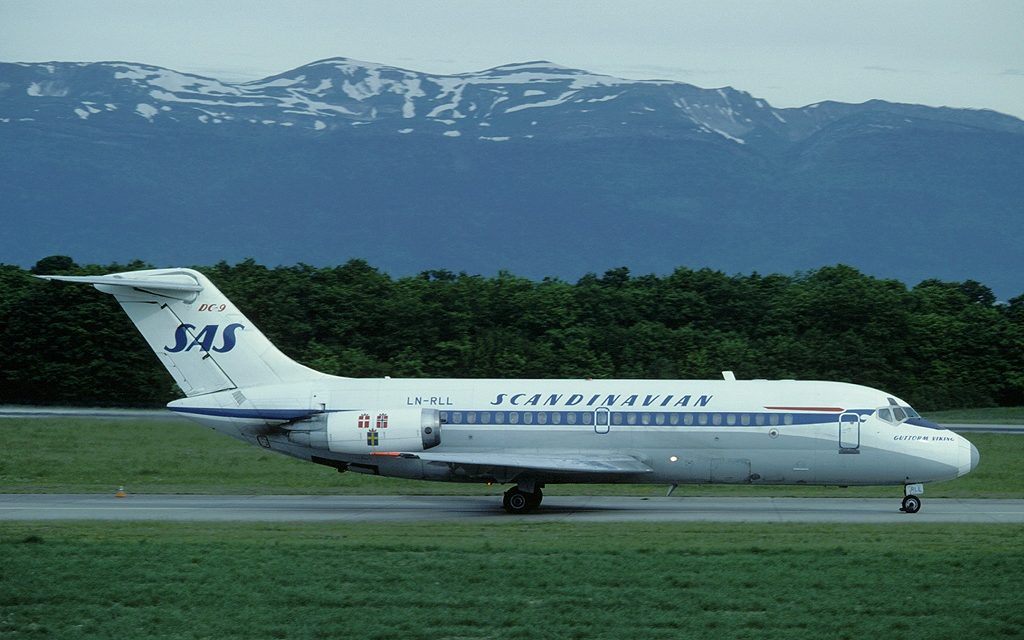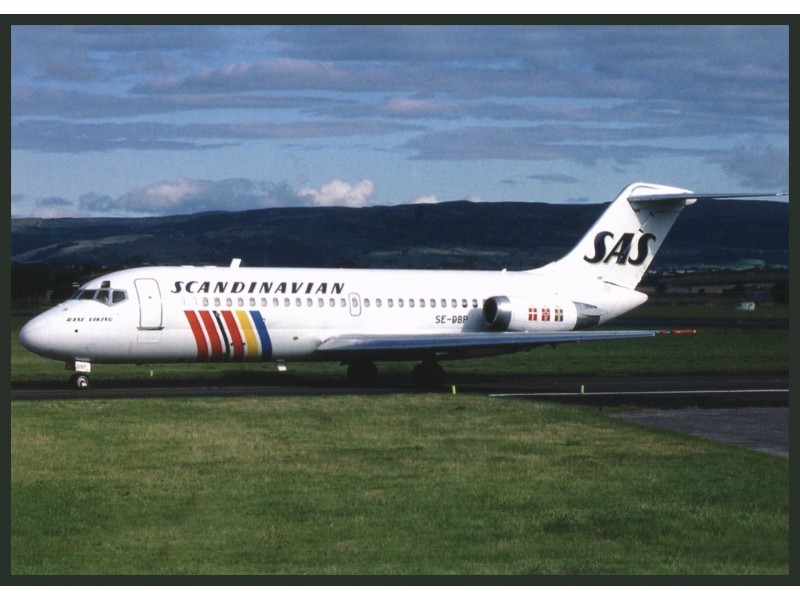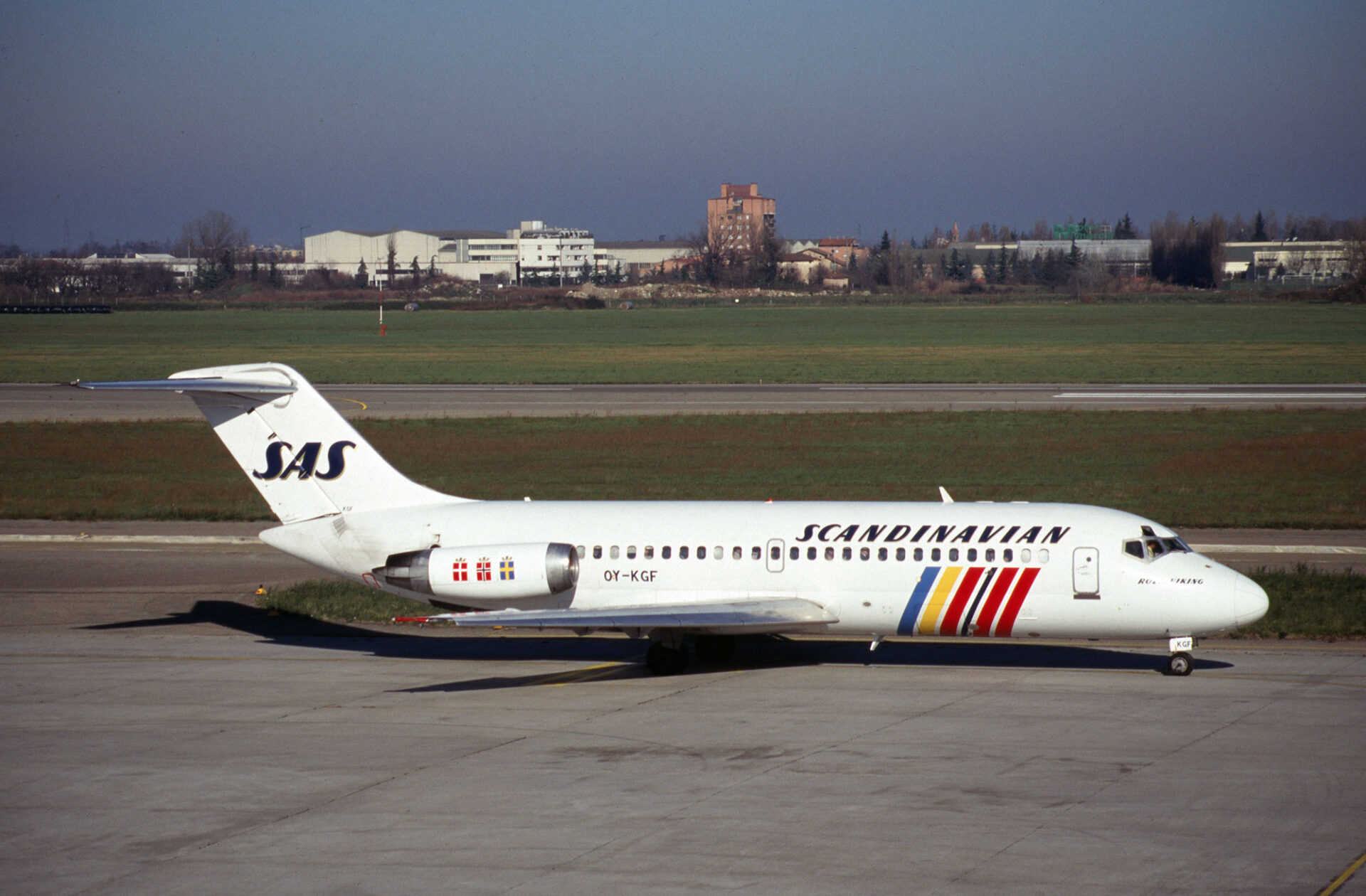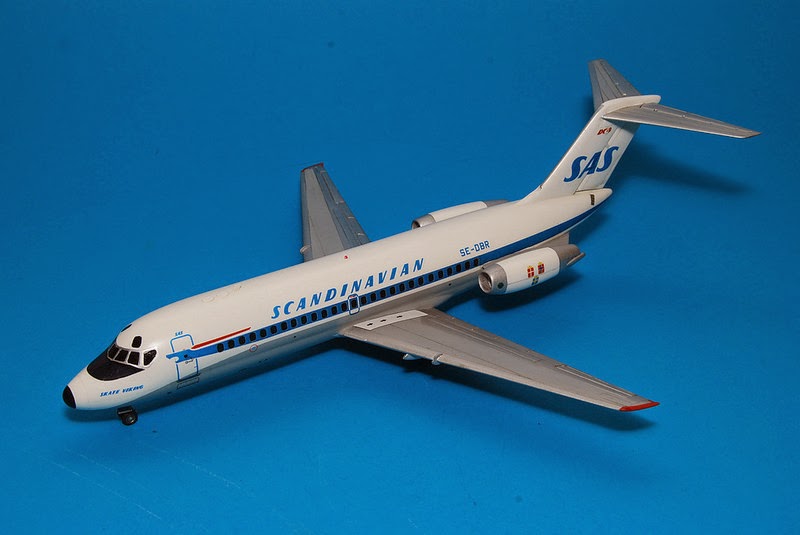
Pin on Airlines of the Past
The Douglas DC-9 is a twin rear engined single aisle jet airliner. The Douglas DC-9 was designed for frequent short flights mainly regional routes.. (SAS) in March 1968, Series 50 The final series is the longest DC-9 produced, this had a 8ft 2 inch fuselage stretch and could seat up to 139 passengers. This started service in August 1975 with.

SAS DC921 OYKIE at ENFB/FBU 05101998 Douglas DC921 … Flickr
The Special Douglas DC-9 For SAS Scandinavian Airlines, a long time Douglas customer, was looking at the DC-9 for their short range flights. At the time, the Long Beach manufacturer offered the original aircraft called the DC-9-10 and a larger version with more range, the DC-9-30.

Why did Douglas make SAS a special version of the DC9? TravelUpdate
The McDonnell Douglas DC-9 is an American five-abreast, single-aisle aircraft designed by the Douglas Aircraft Company. It was initially produced as the Douglas DC-9 prior to August 1967, after which point the company had merged with McDonnell Aircraft to become McDonnell Douglas .

OYKGC McDonnell Douglas DC941 Scandinavian Airlines (SAS
On the night of 30 January 1973, at 11:18pm, the DC-9 (LN-RLM), "Reidar Viking", operating SAS flight SK370, was cleared for takeoff from Rwy 24, departing Oslo-Fornebu (ENFB) for a flight to Alta (ENAT) with an intermediate stop at Tromsø (ENTC). The takeoff run was normal, and the DC-9 duly rotated (lifting its nose from the Rwy) at VR (125kts).

Postcard SAS, DC9
Scandinavian Airlines System Flight 751 was a regularly scheduled Scandinavian Airlines passenger flight from Stockholm, Sweden, to Warsaw, Poland, via Copenhagen, Denmark.

LNRLL DC921 SAS Scandinavian Airlines System, Viking Longship, Air
When Scandinavian Airlines Systems (SAS) made a request for a version of the aircraft with improved short field performance, Douglas responded with the DC-9-20. The same length as the DC-9-10, the DC-9-20 was equipped with uprated JT8D engines as well as revised wings equipped with leading edge slats for enhanced lift.

SASDC9 Airport Spotting
Before we discuss the McDonnell Douglas DC-9s most extended variant, the DC-9-50, let's look at how the plane came to be. During the 1950s, the California-based Douglas Aircraft Company began thinking about building a medium-range plane to complement its high-capacity DC-8s.. The first design it came up with was shunned by potential customers, causing Douglas to abandon the idea.

McDonnell Douglas DC941 Scandinavian Airlines SAS Aviation
Scandinavian Airlines System (SAS) received its first Series 20 aircraft on December 11, 1968, and entered it into service on January 27, 1969. Series 30 Designed to compete with Boeing 737, the DC-9 Serious 30, unlike the Series 10 the Series 30 had leading-edge slats.

McDonnell Douglas DC921 Scandinavian Airlines SAS Aviation
The DC-9-41 had a slightly longer fuselage than the standard 30 series DC-9, many were delivered to SAS and Japanese airlines. Many survivors are now used as freighters. Summary data for McDonnell Douglas DC-9 41

LNRLL McDonnell Douglas DC921 Scandinavian Airlines (SAS) Pete
This cabin is the long-range DC-8-62, a version of the aircraft stretched by 7ft (2.1m), which could seat up to 189 passengers over 5,200 nmi (9,600km). SAS was one of the first customers for the DC-8-62 SAS fitted luxury touches throughout its DC-4 cabins The SAS DC-4 on its inaugural flight from Stockholm to New York The interior of SAS's.

McDonnell Douglas DC951 aircraft picture Aircraft, Vintage aircraft
sas dc-9-80 classic. push back - engine start taxi & take off cph kastrup aug 4. 1992.cph-man flight sk541 atd 17:10other aircraft in video: sk(m80), sk(767).

The Art of Styrene Björns modeller McDonnell Douglas DC921, SAS
The DC-9-20 has an external length of 31.82 meters, an exterior height of 4.7 meters and a tail height of 8.4 meters. It has a fuselage length and diameter of 28.07 meters and 3.35 meters respectively. Its wheelbase is 13.32 meters. The aircraft was intended to operate on short to medium routes, generally to small airports with short runways.

SAS Airlines DC920. Scandinavian airlines system, Aviation history
Swissair ordered a DC-9 tailored to their needs called the DC-9-51. Until delivery of these aircraft, Swissair leased four DC-9-41 from SAS. Similiar to the -51, the -41 was a customer specific version built only for the scandinavian airline. The -41 was 2 meters longer than the -32 and 2.5 meters shorter than the -51. This is only a model !!

SEDBR McDonnell Douglas DC921 Scandinavian Airlines (SAS
The DC-9-40 is a narrow-body jet aircraft built by McDonnell Douglas in response to a Scandinavian Airlines System (SAS) requirement. The aircraft is powered by more powerful Pratt and Whitney engines and can accommodate up to 125 passengers in a single-class configuration. Table of Contents Specifications Photo Gallery Description Manufacturer:

McDonnell Douglas DC933F Scandinavian Airlines SAS Aviation
SAS DC9 FLEET 1968-2002. LN-RLM Aborted takeoff after stallwarning ENFB (Oslo) Overrun the RWY into the water.Write-off. DC9-32 leasing from Swissair. DC9-33F Freighter. SE-DAT Heavy landing at ENVA (Trondheim). Ground spoiler actuation on short final. Write-off. DC9-51 leasing from Swissair. DC9-51 leasing from JAT and Adria.

McDonnell Douglas DC941 Scandinavian Airlines SAS Aviation
Help Category:Douglas DC-9 of SAS Scandinavian Airlines From Wikimedia Commons, the free media repository Subcategories This category has the following 5 subcategories, out of 5 total. Douglas DC-9-20 of Scandinavian Airlines (13 C, 2 F) Douglas DC-9-30 of Scandinavian Airlines (4 C) Douglas DC-9-40 of Scandinavian Airlines (37 C, 3 F)
